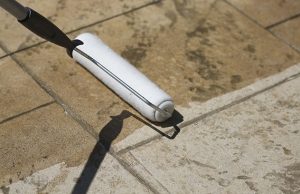Best Penetrating Concrete Sealers
The best penetrating concrete sealers for sealing concrete are silicate concrete sealers and water repellent sealers. Silicate concrete sealers are designed to increase the strength and density while water repellent sealers are designed to reduce surface water absorption.
- Silicate Concrete Sealers: Chemically reactive sealers that increase the strength and density of the concrete by growing a crystalline barrier within the pores. Concrete dusting and deterioration caused by surface absorption is reduced.
- Silane-Siloxane Concrete Sealers: Chemically reactive sealers that form a water repellent barrier in the pores of the concrete. Water absorption through the concrete is reduced by up to 95%, reducing deterioration caused by water absorption such as cracking, spalling, pitting, mold and mildew, and efflorescence.
- Siliconate Concrete Sealers: Chemically reactive sealers that form a water repellent barrier in the pores of the concrete. Water absorption through the concrete is reduced by up to 95%, reducing deterioration caused by water absorption such as cracking, spalling, pitting, mold and mildew, and efflorescence. Siliconate sealers are best used on white or very light concrete only.
When it comes to comparing water repellent sealers, one isn’t necessarily better than the other, but certain applications require certain types of water repellent sealers. The DOT requires that a Silane-Siloxane sealer be used as the primary water repellent sealer for roadways and bridge decks. They are easy to apply and provide years of life and performance. Silane-Siloxane sealers can also be applied to virtually all types of concrete and masonry. Siliconate sealers are very popular in the residential market simply because they require only one coat and for that reason, are very cost effective. Silicone water repellent sealers can only be used on white or light concrete and should not be applied to overly porous or dense concrete because a white residue will form on the surface.
How a water repellent sealer works:
In many cases, people will combine a silicate concrete sealer and a water repellent sealer because they want, or require, both an increase in strength and water repellency. When combining products you will apply the silicate first and then wait at least a week before applying a water repellent. You also want to make sure that you use a Silane Siloxane sealer as the water repellent instead of a siliconate because a silicate in combination with a siliconate could cause a CSH reaction (white residue) on the surface.
Sodium silicate concrete sealer reviews:
- Armor S2000 Concrete Sealer Review
- Stone Technolgies X-1 Concrete Sealer Review
- Ashford Formula Concrete Sealer Review
Silane-Siloxane concrete sealer reviews:
- Armor SX5000 Concrete Sealer Review (average 4.8 star review)
- Siloxane PD Concrete Sealer Review (average 4.5 star review)
- DryWay Water Repellent Concrete Sealer Review (average 3.8 star review)
Siliconate concrete sealer reviews:
- Armor SC25 Siliconate Water Repellent (average 4.9 star review)
- PS101 Siliconate Water Repellent (average 4.7 star review)
Best Acrylic Concrete Sealers
The best acrylic concrete sealers are solvent based acrylic concrete sealers simply because they are significantly easier to apply and maintain. There are a few other differences between the two as well:
- Water based acrylic sealers will not darken the surface of the concr
 ete, but solvent based acrylic sealers will. The only way to achieve a true wet look is with a solvent based acrylic sealer.
ete, but solvent based acrylic sealers will. The only way to achieve a true wet look is with a solvent based acrylic sealer. - Water based acrylic sealers require the surface to be screen-scuffed before re-coating. Solvent based acrylic sealers do not require that the surface be screen-sanded and instead, just require that a fresh coat be applied to a clean and dry surface.
- Damaged or deteriorating water based acrylic sealers often have to be removed, but damaged or deteriorating solvent based acrylics can simply be repaired with xylene.
Regardless of whether or not you are using a water or solvent based acrylic sealer, both sealers are available in three forms: acrylic lacquer sealer, acrylic co-polymer sealer, or acrylic latex sealer.
- Acrylic lacquer sealers are pure acrylic sealers that offer an aggressive bond and strong top coat.
- Acrylic co-polymers are enhances with styrene and often used as cure and seals for new concrete. Acrylic latex sealers contain latex which is a non-breathable paint.
- Acrylic latex sealers should never be used. Aside from not being breathable, they are impossible to repair and maintain.
If your concrete is already cured, it is best to apply an acrylic lacquer sealer. If your concrete isn’t cured, it is best to apply an acrylic co-polymer. It won’t hurt to apply a co-polymer to cured concrete, but if a lacquer is available it is best to apply the acrylic in its purest form.
There are many benefits to using an acrylic concrete sealer over a penetrating concrete sealer. While acrylic sealers require upkeep every 1-2 years, they provide a protective surface coating. The coating offers many benefits, including:
- Protecting against fading and discoloration.
- Protection against staining.
- Protection against deterioration caused by freeze-thaw cycles and road salts.
- Protection against deterioration caused by surface abrasion.
- Protection against the growth of mold and mildew.
- Protection against efflorescence.
Best acrylic concrete sealers:
Best Sealers For Concrete
Which sealer is best for your concrete application will depend on what you need the concrete sealer to do and once you want the concrete to look like once sealed. The information above is a great resource for learning about the best concrete sealers.
Certain sealers perform better than others on different times of concrete surfaces however. Here is a list of the most common types of concrete and masonry surfaces, and which concrete sealers can be applied to them.
| Silicate Sealers | Silane Siloxane Sealers | Acrylic Sealers | |
| Red Clay Brick | X | ||
| Brick Pavers | X | X | |
| Natural Stone | X | ||
| Poured Concrete | X | X | X |
| Stamped Concrete | X | X | |
| Flagstone | X | ||
| Slate | X | ||
| Granite | X |

